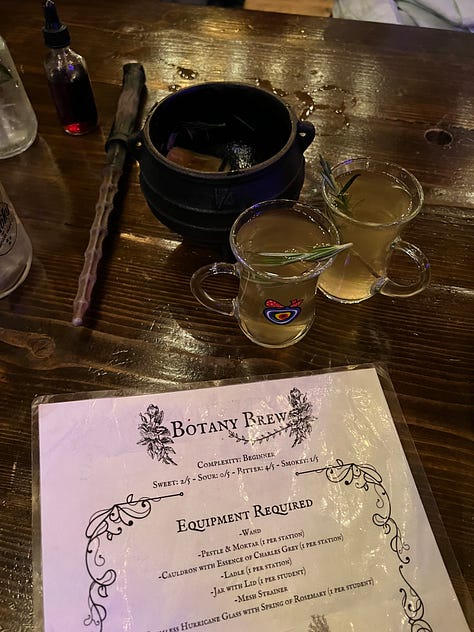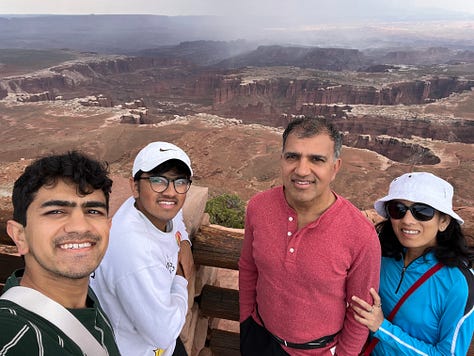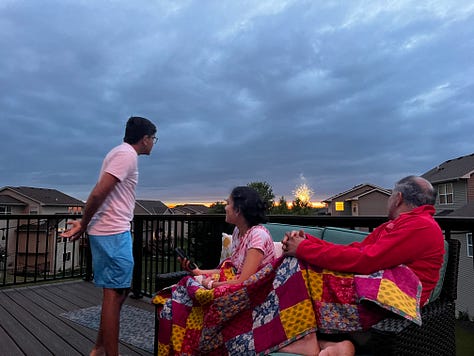mid-year mental inventory
reflection on how this year has gone, what's been on my mind, and what's next
It’s hard to believe we’re already a little over halfway through 2023. There’s been so much that happened.
The year began with my family recovering from an awful adventure with the U.S. Passport Agency after my brother wasn’t permitted to board his flight to Jordan. In the weeks shortly thereafter, there were several projects swirling around; my family was in the final stages of finishing our basement, I had just begun a bartending course, and I got a lasik procedure done to finally restore my eyes back to 20-20 vision. Afterwards, it was all travel. There were several trips to Arlington, one to New York, twice to Charlotte, a family trip to Utah, a friends trip to Austin, a weekend trip to San Francisco, and a work trip to Atlanta. Over the last few weeks, I've finally had some time to breathe at home and get back to my comfortable routine of reading, golf, and family time with some work sprinkled in.


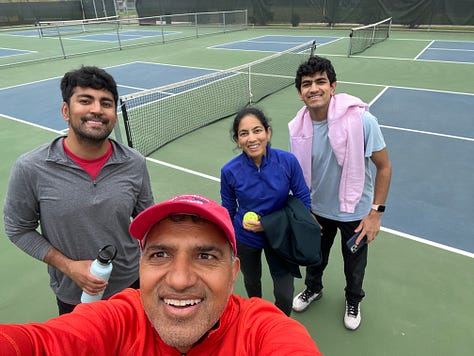
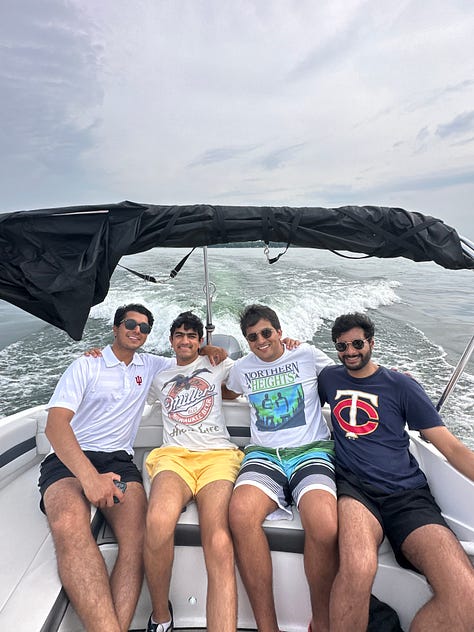
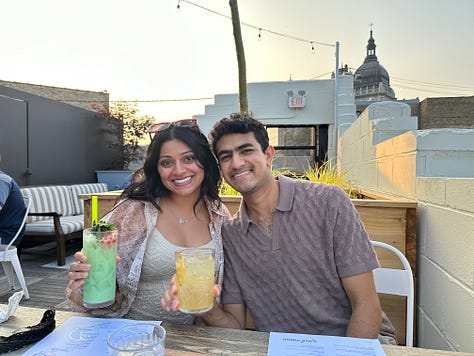
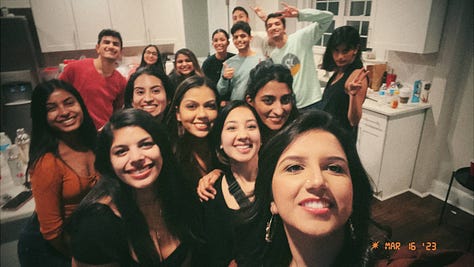



Overall, it’s been an amazing year. I’m so grateful for all the adventures and experiences I’ve had and all the relationships I’ve continued to develop. It’s hard to believe how much I’ve had the opportunity to do. It doesn’t really feel real, and I only pray that wonderful opportunities continue to find their way to me.
On the other hand, it’s been frustrating at times. Amidst all the chaos going on, I’ve struggled to consistently carve out daily time for myself to meditate, journal, and remind myself of my intentions and mantras. Maybe I subconsciously thought I’d be able to maintain the mental clarity I worked so hard to develop last year while being much more disciplined with my habits than I am now, but the last few months have proven me completely wrong. There are so many times I’ve mentally spiraled and slipped into a mental fog, and instead of using the tools I’ve gained over the last year to snap out of it, I’ve let those states persist for days at a time. Often times, things have started to feel monotonous or mechanical, and when that happens, I’m struggling to immediately course correct and find ways to infuse my days with wonder, awe, faith, and belief. I know I’ll figure it out, but I clearly have a long ways to go to attain full mastery of my thoughts and feelings.
I’ve used this space to kind of take a full mental inventory of the things that have been on my mind. I’ve structured it like this:
Things that stuck with me - books and articles that I read that resonated so deeply that I continue to revisit them or the ideas within them frequently
In the works - an overview of what’s currently on the docket for me in terms of writing
Quotes - ideas that I came across that were particularly evocative
Intentions for the second half of the year - where I’m going to dedicate my attention and focus towards in the coming months
things that stuck with me
There were several books that I read over the last few months that I loved. Pierce Brown’s Red Rising trilogy was pretty entertaining overall and contained some interesting ideas about leadership that were fun to dwell on. Brandon Sanderson’s Mistborn Era 2 was incredible; I can’t believe I waited so long to finally give it a shot. Every one of his books continues to surprise me both in terms of the story development and character development; I feel like I always learn so much about the different expressions of certain personality traits in his books. American Gods by Neil Gaiman was incredible; it was built upon the concept of the manifestation of mythical characters in modern-day America, and while I know that a good chunk of it went over my head, it was just an incredibly evocative read.
By far the most powerful book that I read, though, was Letting Go by David Hawkins. He outlined the impacts that runaway emotions and feelings can have both on your internal mental state but also the external environment around you, and provided a guide on how to transcend lower energy emotions and feelings to rise to higher energetic states that will transform your life. It was practical and simple but life-changing at the same time, and I can’t wait to reread it again.
There were also a lot of articles that continued to stick with me through the first half of the year. The first is called The Scientific Virtues. It’s beautifully written, and outlines a set of essential qualities and traits that give birth to good scientists.
Teaching someone painting techniques without teaching them composition will lead to lifeless paintings. Giving business advice to someone who lacks civic duty will lead to parasitic companies. Teaching generals strategy without teaching them honor gets you warlords. So teaching someone the methods of science without teaching them the virtues will lead to dull, pointless projects. Virtue is the key to happy, creative, important, meaningful research.
For me, it was less so the virtues themselves, but the idea expressed in the quote above about virtues (or principles) first thinking that really stuck with me. Principles and intentions before actions is an idea that I now carry with me in pretty much every domain.
Another article that I read a while ago that continues to live rent free in my head is Don’t Read History for Lessons by Cedric Chin. It changed the way I look at pretty much any past event that’s happened. Typically, when people study history or reflect on past events, they attempt to pull lessons or takeaways from what happened that they will carry with them going forward. Cedric makes an incredible case that this is a faulty approach for studying history for two reasons.
Everything in life is path dependent. A lucky break early in a person’s career makes all their latter successes easier; a lucky decision early on in a company’s life makes their latter projects more likely to succeed. You can’t replicate a company’s success, nor learn from their failures, if you don’t also replicate their path. And it is impossible to replicate their path. As a throwaway example, think back to the legendary, non-exclusive deal IBM made with Microsoft for MS-DOS in 1980 — which allowed Microsoft to sell DOS to every other PC-compatible manufacturer. This deal is often described as “IBM’s great mistake”. Had they not done the deal, Microsoft would have had a very different set of opportunities in the ensuing decade. But IBM did do the deal with Microsoft, and that, in turn, set the stage for Microsoft’s dominance in operating systems for years afterwards. It may not be useful to learn the lessons of Microsoft’s history when much of what they accomplished hinged on chance events and idiosyncratic decisions in their past.
The second argument against reading history is even more harsh. The argument is that accountings of history are not accurate, and can never be accurate, thanks to the narrative fallacy. By its nature, narrative necessarily compresses reality into some coherent tale, meaning that accountings of history tend to overemphasise intention and action, instead of the more plausible ‘random actions by actors in a complex adaptive system, conspiring to create unexpected results’. This is a roundabout way of saying that whatever histories you read are most likely wrong — and not even a good representation of reality.
The conclusion of this article is that you should read history and past events as a set of case studies of ways things can possible unfold. Instead of using these studies to guide you on what you expect to happen in the future, it should give you a greater appreciation of the impact of random chance and luck.
The goal of reading from history, then, is to expand the set of prototypes in your head.
Beautiful article.
The third is this article by Rob Henderson.
He defines luxury beliefs as “ideas and opinions that confer status on the upper class while inflicting costs on the lower classes”. An examle of a luxury belief is a call to defund the police:
Well, who was the most likely to support the fashionable defund the police cause in 2020 and 2021?
A survey from YouGov found that Americans in the highest income category were by far the most supportive of defunding the police.
They can afford to hold this position, because they already live in safe, often gated communities. And they can afford to hire private security.
In the same way that a vulnerable gazelle can’t afford to engage in stotting because it would put them in increased danger, a vulnerable poor person in a crime-ridden neighborhood can’t afford to support defunding the police.
According to the U.S. Census Bureau, compared to Americans who earn more than $75,000 a year, the poorest Americans are seven times more likely to be victims of robbery, seven times more likely to be victims of aggravated assault, and twenty times more likely to be victims of sexual assault.
Expressing a luxury belief is a manifestation of cultural capital, a signal of one’s fortunate economic circumstances.
I think about this all the time. I’ve been pretty suspicious about overly-political posturing on social media and its performative nature, and this article gave me the vocabulary to express the danger inherent in some of these ideas.
Here are a few other ones that were equally as thought provoking:
Reality has a surprising amount of detail - great high level explanation of the Dunning-Kruger effect i.e. our tendency to overestimate our skills in domains in which we lack experience because we are blind to just how much we don’t know.
in the works
The immediate next thing on my docket to write is a book review of the book Imaginable by Jane McGonigal. She rose to fame because she essentialy designed a game / simulation back in 2008 that basically predicted COVID and Long COVID, and this book is her attempt at explaining the way she thinks and how she creates games and simulations that have such powerful predictive power. I LOVED this book; I had never thought deeply into futures thinking, but this was eye opening and just a wonderful blend of mental simulation and intentional research and their power to prepare you for anything in the future. I’m excited to share my biggest learnings from this and how I plan to make futures thinking a key part of my life moving forward.
The next thing I want to write about is another book review, this time of a book called The Hero With a Thousand Faces by Joseph Campbell. Campbell’s area of expertise is comparative religion and mythology, and this book is an integration of everything he’s learned. It highlights how every single myth essentially shares the same general structure - the hero’s journey - and he outlines what each step in this journey generally looks like. The key piece of insight here is that this journey isn’t literal, but psychological; he argues that each myth is best interpreted as a psychological drama that guides you on the journey towards transcendence and true knowledge and insight. Full disclosure, I haven’t finished this book yet, but I’m so excited to finish and write about it. I’m really interested in blending together some of these ideas with the concept of ‘extended adolescence’ i.e. the idea that most people nowadays are stuck at the same level of emotional maturity as teenagers even as they continue to age. Perhaps there’s a way of interpreting this phenomenon as people refusing the call to action to embark on the hero’s journey, and perhaps that’s related to the general decline of faith in the world and the rise of atheism and nihilism.
I next thing on my writing backlog is yet another book review (of a book I haven’t finished yet, oops) of a book (well, a textbook) called Bowen’s Theory Secrets by Michael Kerr. It’s an explanation of a phenomenon discovered by Dr. Murray Bowen about how families and social groups in general aren’t emotionally separate individuals, but rather act as single emotional units. I won’t really explain any deeper because I don’t really understand it too much, but I’m more so drawn to the fact that this seems to be a practical and deductive proof of the fact that we’re not emotionally isolated beings, but that our energy and feelings have tangible affects on the people around us. Most of the books I’ve read have been inductive in their approach at arriving at this conclusion; they’ve typically started with individuals and then extrapolated how the individual’s circumstances are natural manifestations of their emotional state. This books starts from systems and groups of people and works backwards to what this means for individuals. And it comes to a remarkably similar conclusion! It’s so so cool, and I can’t wait to learn more about it and eventually to write about it.
Outside of these three book-review-type works in progress, there are a few other ideas I’m interested to explore. I want to explore the concepts of balance and time. For example, is a balanced diet one that includes consumption of all food groups in a day? Or is it a week? Or a month? A season? A year? These questions are so interesting to unpack, and I’m not sure if there even is a right answer. But I want to dig a bit deeper and explore the concepts of balance and time across a range of domains. I also want to explore ideas of service, how our emotional states can blind us from seeing things properly, and so much more.
The big thing for me is that I want the stuff I write to be much more properly researched now. I think I can push myself beyond just rambling about the ideas that are on my mind that are derivatives from what I’ve read or come across in my life. I think I can go deeper and further integrate more diverse ideas to write something that has a little more polish and actionable insight. We’ll see how this goes.
quotes
On maintenance
Tim Ferriss: What do you think your 70 year old self would give to your current self as advice?
Sebastian Junger: I think I would say to myself that the world is this continually unfolding set of possibilities and opportunities. And the tricky thing about life is, on the one hand, having the courage to enter into things that are unfamiliar.
But to also have the wisdom to stop exploring when you found something that’s worth sticking around for. And that’s true of a place, of a person, of a vocation. In balancing those two things, the courage of exploring and the commitment to staying, it’s very, very hard to get those two, the ratio, the balance of those two things right. And I think my 70 year old self would say really be careful that you don’t err on side or the other because you have an ill conceived idea of who you are.
This is so powerful. I’ve read a few articles centered around the forgotten art of maintenance and how few people choose to remain and repair the things around them anymore, instead fleeing towards more novelty and indulgence. Our impulses drive us to try and do more, be more, and consume more, but I think true joy is found in the idea of enough.
On education
Our universities fail to guide us down the easiest paths to wisdom… Rather than teaching a sense of awe, they teach the very opposite: counting and measuring over delight, sobriety over enchantment, a rigid hold on scattered individual parts over an affinity for the unified and whole. These are not schools of wisdom, after all, but schools of knowledge, though they take for granted that which they cannot teach — the capacity for experience, the capacity for being moved, the Goethean sense of wonderment.
Beautiful quote about how it’s easy to mistake knowledge for wisdom.
On perspective
If you listen to successful people talk about their methods, remember that all the people who used the same methods and failed did not make videos about it.
I always try to remember that it’s impossible to know the true power or impact of something without doing a true statistical test. Even if you see 5 people in your personal circle find success employing one strategy, the only way to know its effectiveness is to study the full population of people that tried that strategy and identify the rate of success. Obviously that’s impossible, so instead of trying to imitate people that maybe are mis-attributing their causes of success, I’m just gonna find my own way.
On group discussions
Historian Cyril Parkinson coined a thing called Parkinson’s Law of Triviality. It states: “The amount of attention a problem gets is the inverse of its importance.” Parkinson described a fictional finance committee with three tasks: approval of a $10 million nuclear reactor, $400 for an employee bike shed, and $20 for employee refreshments in the break room. The committee approves the $10 million nuclear reactor immediately, because the number is too big to contextualize, alternatives are too daunting to consider, and no one on the committee is an expert in nuclear power. The bike shed gets considerably more debate. Committee members argue whether a bike rack would suffice and whether a shed should be wood or aluminum, because they have some experience working with those materials at home. Employee refreshments take up two-thirds of the debate, because everyone has a strong opinion on what’s the best coffee, the best cookies, the best chips, etc. Many households operate the same.
This quote basically speaks for itself. It’s a constant reminder for me to, especially in groups, stay mindful of what’s important instead of getting sucked into rabbit holds.
On efficiency
Approach time from a place of abundance, not scarcity.” Our culture encourages us to feel as though time is always running out, which creates feelings of anxiety and can replace calm focus with a hum of frenzied energy. If we trust that there is enough time, perhaps we can give ourselves the chance to go deeper, be more present, and engage more authentically.
So many people strive for efficient lives, where no hour is wasted. But when no hour is wasted you have no time to wander, explore something new, or let your thoughts run free – which can be some of the most productive forms of thought. Psychologist Amos Tversky once said “the secret to doing good research is always to be a little underemployed. You waste years by not being able to waste hours.
“You waste years by not being able to waste a few hours.” Amazing reminder for me every time I find myself driven by the compulsion to maximize every second of every day.
On simplicity
A complex system that works is invariably found to have evolved from a simple system that worked. The inverse proposition also appears to be true: A complex system designed from scratch never works and cannot be made to work. You have to start over, beginning with a working simple system.
Always start with simple systems. Another great reminder.
On self-rationalization
People are masters at justifying why they don’t want to do things, but the most dangerous justifications come when a vice is made to look like a virtue. We all do it. In your own life, ask yourself: “How am I rationalizing my resistance to doing things I need to do?”
For me, this danger is compounded by my debate background and my ability to craft cases to defend virtually any idea. I’m so scared about my ability to delude myself into justifying poor actions.
On science
And here’s what Werner Heisenberg has to say: “The first gulp from the glass of natural sciences will turn you into an atheist, but at the bottom of the glass God is waiting for you.”
All roads lead to Rome.
On persistence
When nothing seems to help, I go and look at a stonecutter hammering away at his rock, perhaps a hundred times without as much as a crack showing in it. Yet at the hundred and first blow it will split in two, and I know it was not that last blow that did it, but all that had gone before.
Just keep swimming.
intentions for the second half of the year
There are so many things I want to get to at some point that I wanted to get to during the first half of the year but didn’t get a chance to. I want to develop some drawing skills. I want to get back to playing the violin. I want to invest some time diving deeper into data-driven process optimization or lean six sigma because I feel like those ideas mesh so deeply with my problem-solving approaches. I feel an urgency to master prompt engineering so I don’t get caught being late to the game in understanding how to leverage some of these AI tools.
Realistically, I don’t really think I’ll be able to get to any of these before the end of the year, but a man can dream.
There are so many interesting challenges that are coming up that will dominate my time and attention. The biggest one is my upcoming move to New York in September. I’m curious how I’ll settle into the city and how my relationship with my family will continue to develop after 2 blissful years of living together. I’m excited to see how my bartending career continues to develop. I’m pretty set on finding some kind of job in New York. I never want to think of myself as above service work, and I’m excited to see what that experience will be like. The most time consuming commitments, of course, are going to be my job and my role as director of Legends. With both of them, I don’t really have any idea what to expect over the coming year, but I still have a high degree of faith that whatever challenges I encounter in both roles are going to mold me into exactly the person and leader I need to be in the years to come.
In terms of my intentions, they’re quite simple and were alluded to at the start of this piece. I just want to prioritize my mental and spiritual development; nothing is more important than obtaining full mastery of my thoughts and emotions. I want to continue to stay present, stay opportunistic, and stay positive no matter what comes my way. I want to continue pushing myself to be more patient and more deliberate with my actions instead of getting caught up in the chaos around me. And I want to see how well I can prioritize all this in a new city that’s full of constant temptation and stimulation.


